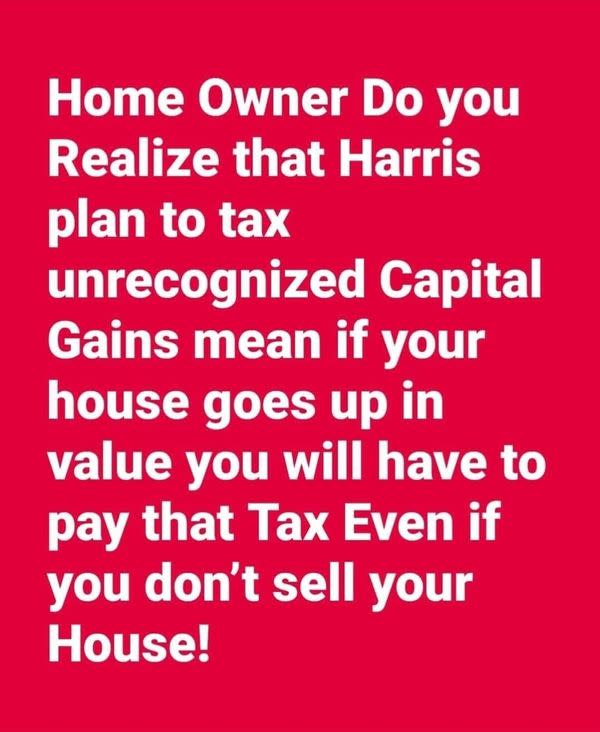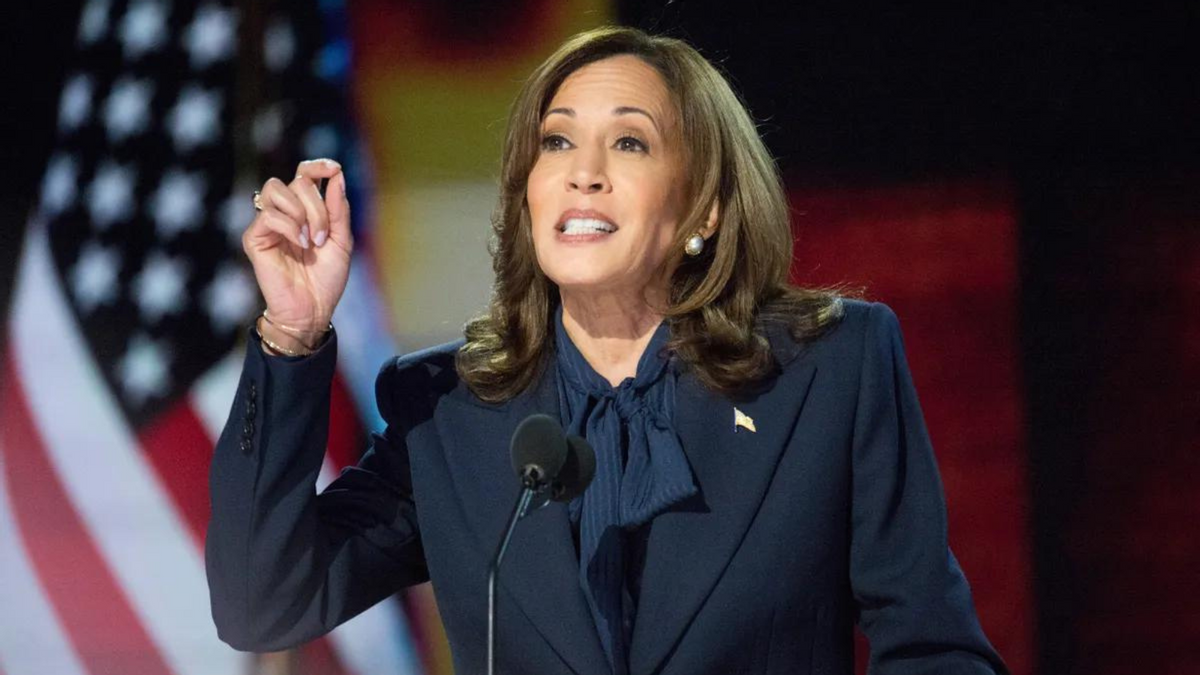Claim:
If elected, Kamala Harris plans to institute a 25% tax on unrealized capital gains, which will hurt the middle class and cause an “economic calamity.”
Rating:
What’s True:
It’s true Harris endorsed a plan to institute a 25% tax on unrealized capital gains. However …
What’s False:
… The plan specified that the tax would apply only to those with wealth exceeding $100 million — i.e., not the middle class. Given that it would therefore only affect the wealthiest 0.01% in the country, it is unlikely to cause an “economic calamity.”
While the Democratic National Convention took place in Chicago, Illinois, in August 2024, a rumor began to spread that the party’s presidential nominee, U.S. Vice President Kamala Harris, had endorsed a 25% tax on unrealized capital gains (archived):
Kamala is proposing an *INSANE* 25% tax on unrealized capital gains.
Imagine buying shares for $100,000, and their value rises to $150,000.
Under Kamala’s plan, you’d owe taxes on the $50,000 gain, even though you haven’t sold the shares or made any actual profit.
Now, imagine…
— KanekoaTheGreat (@KanekoaTheGreat) August 20, 2024
This post had received 4.7 millions views and 59,000 likes as of this writing. Others on X made the same claim, with one arguing this measure would double home prices (archived). U.S. Rep. Lauren Boebert, a Republican from Colorado, said this new tax would harm the middle class most (archived).
Vivek Ramaswamy, an entrepreneur who ran and lost in the 2024 Republican primary against former President Donald Trump, said it would result in an “economic calamity” (archived).
“The Harris Walz ticket plan to tax, up to 44%, unrealized capital gains regardless of how much you earn annually,” one Snopes reader wrote in an email. Another shared a meme they had seen on Facebook:

An examination of the claims revealed that they were a mix of true and false information.
What Are Unrealized Capital Gains, and What Would This Plan Actually Do?
Unrealized capital gains describe the value an asset has gained while under someone’s ownership. Realized capital gains are the effective profit at the sale of one’s assets. So for example, if someone bought a house in 2012 for $200,000 and the house is now worth $250,000 but that person still owns it, the unrealized capital gains are $50,000. These are also known as “paper” gains.
Starting Aug. 16, 2024, the Harris campaign began to outline its economic plan. In doing so, it endorsed President Joe Biden’s 2025 budget, whose revenue proposals included a “minimum [income] tax on billionaires,” which the budget said would raise $500 billion over 10 years. Those unrealized capital gains would be taxed as income.
According to the proposals, the 25% tax on unrealized capital gains would apply only to people with a net worth of $100 million or more, or the richest 0.01% of people in the country. Contrary to Boebert’s assertion, it would not directly affect the middle class. Even then, it would not apply to the entirety of the concerned group, but only to those who own 80% of their wealth in tradable assets (stocks, bonds, crypto currencies — in other words, securities that can be sold easily on a secondary market).
This would exclude anyone whose fortune is made up of shares in privately held businesses or real estate — i.e., startup owners or investors. As a result, this would not, in fact, “double home prices,” because no one would have to pay it on their homes or any of their real estate holdings, contrary to what some opponents of the measure have suggested.
Its proponents have argued that this tax would contribute to reducing wealth inequities. One reason for this is that people can often borrow money at lower interest rates against the current value of their assets, which can include unrealized capital gains. As such, the Biden administration decided to treat them as income:
Proposes a Minimum Tax on Billionaires.
The tax code currently offers special treatment for the types of income that wealthy people enjoy. While the wages and salaries that everyday Americans earn are taxed as ordinary income, billionaires make their money in ways that are taxed at lower rates, and sometimes not taxed at all. This special treatment, combined with sophisticated tax planning and giant loopholes, allows many of the wealthiest Americans to pay lower rates on their full income than many middle-class households pay. To finally address this glaring inequity, the Budget includes a 25 percent minimum tax on the wealthiest 0.01 percent, those with wealth of more than $100 million.
One supporter argued in MarketWatch that this would be no different than paying city taxes on his home based on its “assessed value” each year.
But the proposal’s critics fear that it would hinder risk-taking, which is an essential part of keeping an economy vibrant. For example Florida Atlantic University College of Business professor Siri Terjesen wrote in July 2024 it would act like a “kill-switch for entrepreneurship.” “Investors may be less likely to invest in growth-oriented ventures due to greater swings in valuation compared to larger, established companies,” she said.
Given that this measure is only set to affect the wealthiest 0.01% of the population, however, it is unlikely to cause an “economic calamity.” If it were to apply to people in the middle class, on their homes or their investments, it might, in fact, affect their purchasing power, their ability to plan for the future or their ability to own homes. As it stands, however, the measure is too limited in scope for that.
As for the 44.6% tax rate alluded to in an email from a Snopes reader, it referred to a pair of proposals that would increase the top ordinary tax rate on long-term capital gains and qualified dividends to 39.6% from the current 37% for those who earn more than $1 million, and the net investment rate by 1.2 percentage points to 5% for those who earn more than $400,000. In 2024, this rate was 40.8%.
Sources:
Arends, Brett. ‘Opinion: Kamala Harris’s Critics Are Totally Wrong about Taxing Unrealized Gains’. Marketwatch, 24 Aug. 2024, https://www.marketwatch.com/story/kamala-harriss-critics-are-totally-wrong-about-taxing-unrealized-gains-8275e55c.
Budget of the U.S. Government. White House, Fiscal Year 2025, https://www.whitehouse.gov/wp-content/uploads/2024/03/budget_fy2025.pdf.
General Explanations of the Administration’s Fiscal Year 2025 Revenue Proposals. U.S. Department of the Treasury, 11 Mar. 2024, https://home.treasury.gov/system/files/131/General-Explanations-FY2025.pdf.
Terjesen, Siri. ‘Biden’s Tax on Unrealized Gains Would Be Kill Switch for Entrepreneurship’. The Daily Signal, 12 July 2024, https://www.dailysignal.com/2024/07/12/bidens-tax-on-unrealized-gains-would-be-kill-switch-for-entrepreneurship/.
Vice President Harris Lays Out Agenda To Lower Costs for American Families. https://mailchi.mp/press.kamalaharris.com/vice-president-harris-lays-out-agenda-to-lower-costs-for-american-families. Accessed 26 Aug. 2024.
